BUS706: International Business Law and Ethics Assignment Solution
VerifiedAdded on 2023/03/30
|13
|2884
|189
Homework Assignment
AI Summary
This assignment solution provides a detailed analysis of three case studies related to international business law and ethics. The first case examines the ethical implications of Donald Trump's trade ban on Huawei, applying utilitarian and deontological ethical theories. The second case evaluates the validity of an electronic contract between Kettle Black and PuriTea, considering the UN Convention on the Use of Electronic Communications in International Contracts (ECC), the UN Convention on Contracts for the International Sale of Goods (CISG), and the UNCITRAL Model Law on Electronic Signatures (MLES). It also addresses the validity of an electronic signature and the potential for amending a typographic error. The third case study focuses on dispute settlement through international arbitration, specifically the enforceability of an arbitration award under the New York Convention, where Wicks provided wrong scented candles to Styled. The analysis explores whether the award is enforceable and examines the implications of Styled not being legally incorporated in Canada, ultimately making a choice between arbitration and litigation for resolving a breach of intellectual property issue. The solution follows the IRAC structure for legal analysis, providing a comprehensive understanding of the legal issues, rules, applications, and conclusions for each case.
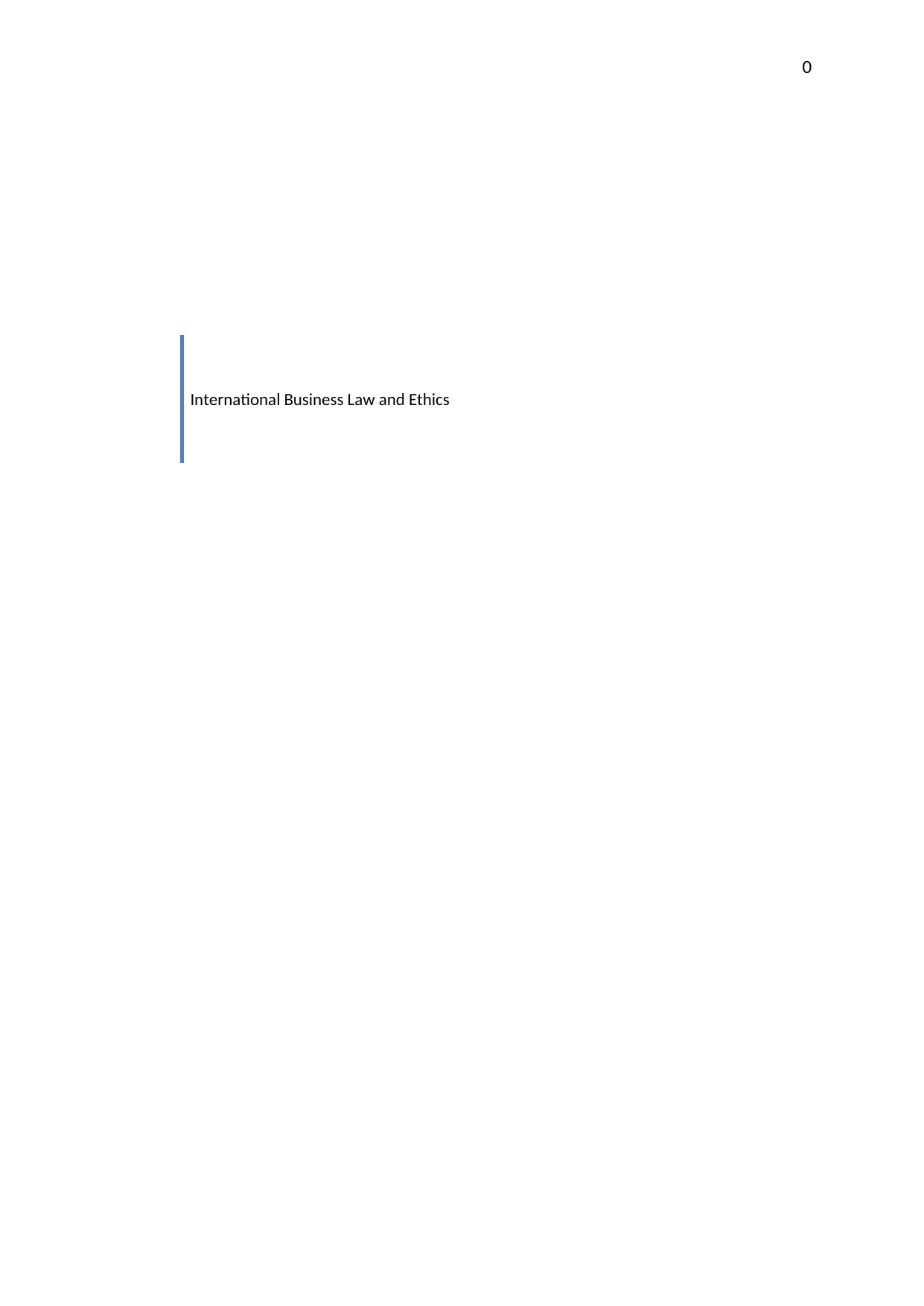
0
International Business Law and Ethics
International Business Law and Ethics
Paraphrase This Document
Need a fresh take? Get an instant paraphrase of this document with our AI Paraphraser
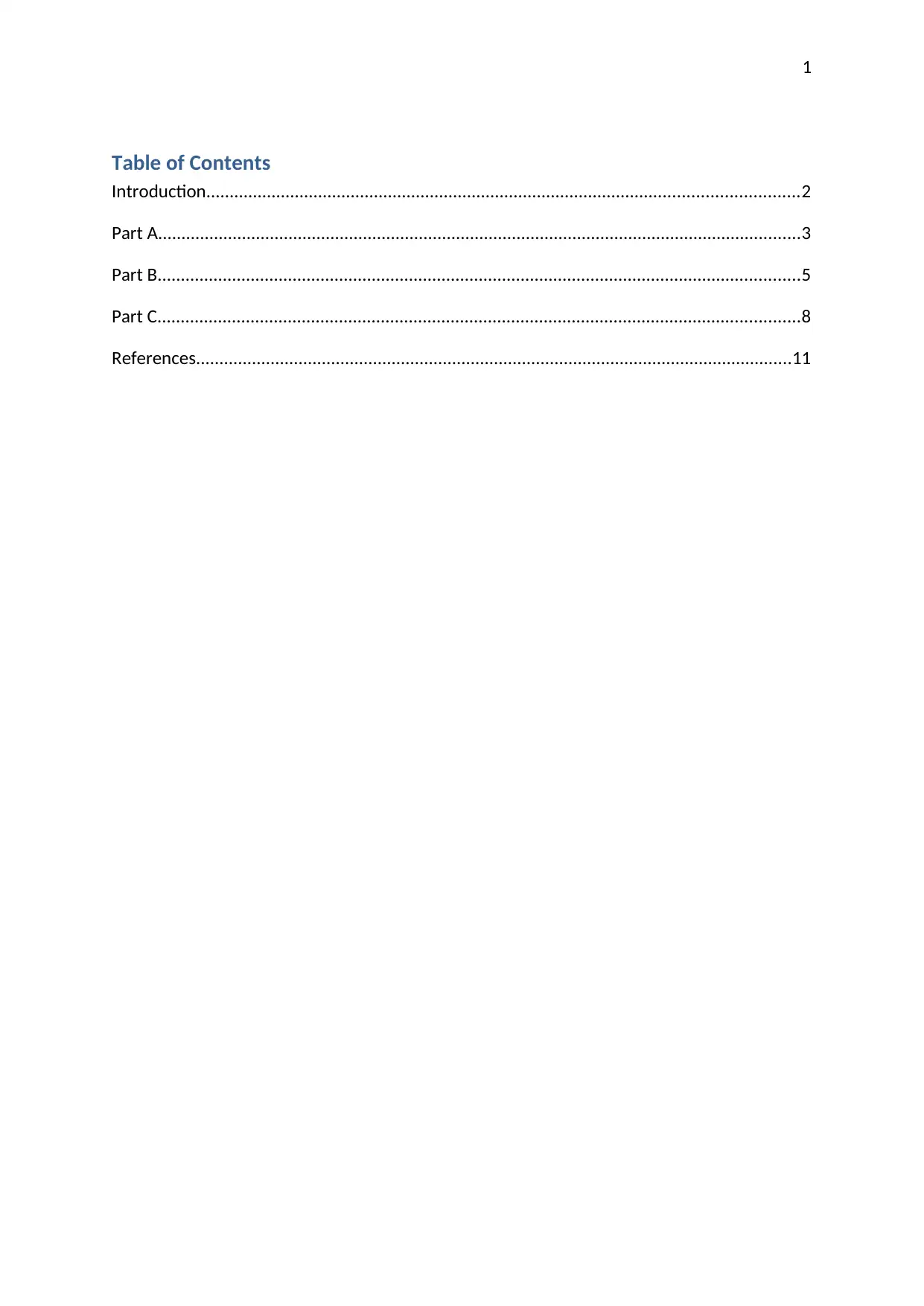
1
Table of Contents
Introduction...............................................................................................................................2
Part A..........................................................................................................................................3
Part B..........................................................................................................................................5
Part C..........................................................................................................................................8
References................................................................................................................................11
Table of Contents
Introduction...............................................................................................................................2
Part A..........................................................................................................................................3
Part B..........................................................................................................................................5
Part C..........................................................................................................................................8
References................................................................................................................................11
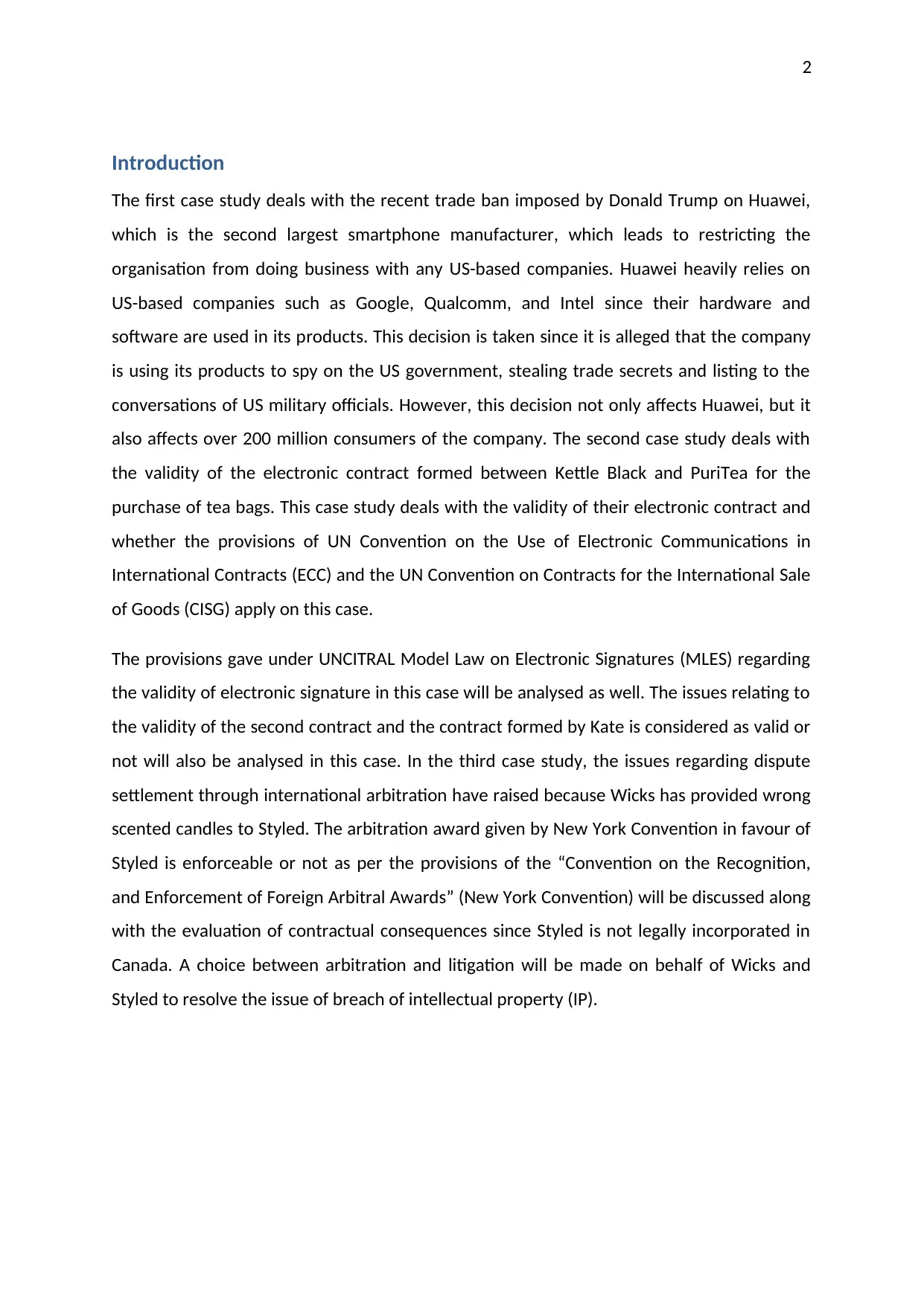
2
Introduction
The first case study deals with the recent trade ban imposed by Donald Trump on Huawei,
which is the second largest smartphone manufacturer, which leads to restricting the
organisation from doing business with any US-based companies. Huawei heavily relies on
US-based companies such as Google, Qualcomm, and Intel since their hardware and
software are used in its products. This decision is taken since it is alleged that the company
is using its products to spy on the US government, stealing trade secrets and listing to the
conversations of US military officials. However, this decision not only affects Huawei, but it
also affects over 200 million consumers of the company. The second case study deals with
the validity of the electronic contract formed between Kettle Black and PuriTea for the
purchase of tea bags. This case study deals with the validity of their electronic contract and
whether the provisions of UN Convention on the Use of Electronic Communications in
International Contracts (ECC) and the UN Convention on Contracts for the International Sale
of Goods (CISG) apply on this case.
The provisions gave under UNCITRAL Model Law on Electronic Signatures (MLES) regarding
the validity of electronic signature in this case will be analysed as well. The issues relating to
the validity of the second contract and the contract formed by Kate is considered as valid or
not will also be analysed in this case. In the third case study, the issues regarding dispute
settlement through international arbitration have raised because Wicks has provided wrong
scented candles to Styled. The arbitration award given by New York Convention in favour of
Styled is enforceable or not as per the provisions of the “Convention on the Recognition,
and Enforcement of Foreign Arbitral Awards” (New York Convention) will be discussed along
with the evaluation of contractual consequences since Styled is not legally incorporated in
Canada. A choice between arbitration and litigation will be made on behalf of Wicks and
Styled to resolve the issue of breach of intellectual property (IP).
Introduction
The first case study deals with the recent trade ban imposed by Donald Trump on Huawei,
which is the second largest smartphone manufacturer, which leads to restricting the
organisation from doing business with any US-based companies. Huawei heavily relies on
US-based companies such as Google, Qualcomm, and Intel since their hardware and
software are used in its products. This decision is taken since it is alleged that the company
is using its products to spy on the US government, stealing trade secrets and listing to the
conversations of US military officials. However, this decision not only affects Huawei, but it
also affects over 200 million consumers of the company. The second case study deals with
the validity of the electronic contract formed between Kettle Black and PuriTea for the
purchase of tea bags. This case study deals with the validity of their electronic contract and
whether the provisions of UN Convention on the Use of Electronic Communications in
International Contracts (ECC) and the UN Convention on Contracts for the International Sale
of Goods (CISG) apply on this case.
The provisions gave under UNCITRAL Model Law on Electronic Signatures (MLES) regarding
the validity of electronic signature in this case will be analysed as well. The issues relating to
the validity of the second contract and the contract formed by Kate is considered as valid or
not will also be analysed in this case. In the third case study, the issues regarding dispute
settlement through international arbitration have raised because Wicks has provided wrong
scented candles to Styled. The arbitration award given by New York Convention in favour of
Styled is enforceable or not as per the provisions of the “Convention on the Recognition,
and Enforcement of Foreign Arbitral Awards” (New York Convention) will be discussed along
with the evaluation of contractual consequences since Styled is not legally incorporated in
Canada. A choice between arbitration and litigation will be made on behalf of Wicks and
Styled to resolve the issue of breach of intellectual property (IP).
⊘ This is a preview!⊘
Do you want full access?
Subscribe today to unlock all pages.

Trusted by 1+ million students worldwide
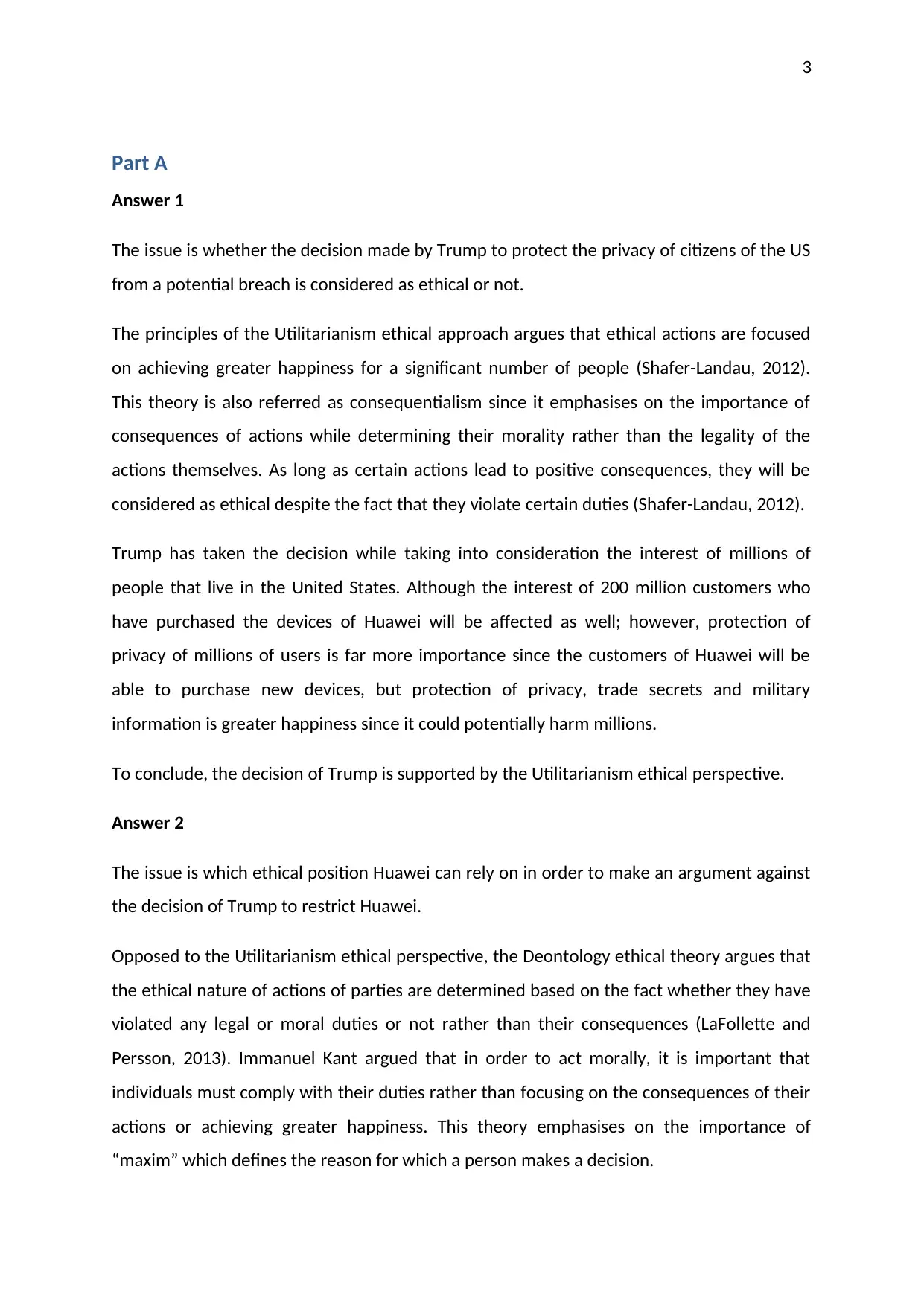
3
Part A
Answer 1
The issue is whether the decision made by Trump to protect the privacy of citizens of the US
from a potential breach is considered as ethical or not.
The principles of the Utilitarianism ethical approach argues that ethical actions are focused
on achieving greater happiness for a significant number of people (Shafer-Landau, 2012).
This theory is also referred as consequentialism since it emphasises on the importance of
consequences of actions while determining their morality rather than the legality of the
actions themselves. As long as certain actions lead to positive consequences, they will be
considered as ethical despite the fact that they violate certain duties (Shafer-Landau, 2012).
Trump has taken the decision while taking into consideration the interest of millions of
people that live in the United States. Although the interest of 200 million customers who
have purchased the devices of Huawei will be affected as well; however, protection of
privacy of millions of users is far more importance since the customers of Huawei will be
able to purchase new devices, but protection of privacy, trade secrets and military
information is greater happiness since it could potentially harm millions.
To conclude, the decision of Trump is supported by the Utilitarianism ethical perspective.
Answer 2
The issue is which ethical position Huawei can rely on in order to make an argument against
the decision of Trump to restrict Huawei.
Opposed to the Utilitarianism ethical perspective, the Deontology ethical theory argues that
the ethical nature of actions of parties are determined based on the fact whether they have
violated any legal or moral duties or not rather than their consequences (LaFollette and
Persson, 2013). Immanuel Kant argued that in order to act morally, it is important that
individuals must comply with their duties rather than focusing on the consequences of their
actions or achieving greater happiness. This theory emphasises on the importance of
“maxim” which defines the reason for which a person makes a decision.
Part A
Answer 1
The issue is whether the decision made by Trump to protect the privacy of citizens of the US
from a potential breach is considered as ethical or not.
The principles of the Utilitarianism ethical approach argues that ethical actions are focused
on achieving greater happiness for a significant number of people (Shafer-Landau, 2012).
This theory is also referred as consequentialism since it emphasises on the importance of
consequences of actions while determining their morality rather than the legality of the
actions themselves. As long as certain actions lead to positive consequences, they will be
considered as ethical despite the fact that they violate certain duties (Shafer-Landau, 2012).
Trump has taken the decision while taking into consideration the interest of millions of
people that live in the United States. Although the interest of 200 million customers who
have purchased the devices of Huawei will be affected as well; however, protection of
privacy of millions of users is far more importance since the customers of Huawei will be
able to purchase new devices, but protection of privacy, trade secrets and military
information is greater happiness since it could potentially harm millions.
To conclude, the decision of Trump is supported by the Utilitarianism ethical perspective.
Answer 2
The issue is which ethical position Huawei can rely on in order to make an argument against
the decision of Trump to restrict Huawei.
Opposed to the Utilitarianism ethical perspective, the Deontology ethical theory argues that
the ethical nature of actions of parties are determined based on the fact whether they have
violated any legal or moral duties or not rather than their consequences (LaFollette and
Persson, 2013). Immanuel Kant argued that in order to act morally, it is important that
individuals must comply with their duties rather than focusing on the consequences of their
actions or achieving greater happiness. This theory emphasises on the importance of
“maxim” which defines the reason for which a person makes a decision.
Paraphrase This Document
Need a fresh take? Get an instant paraphrase of this document with our AI Paraphraser
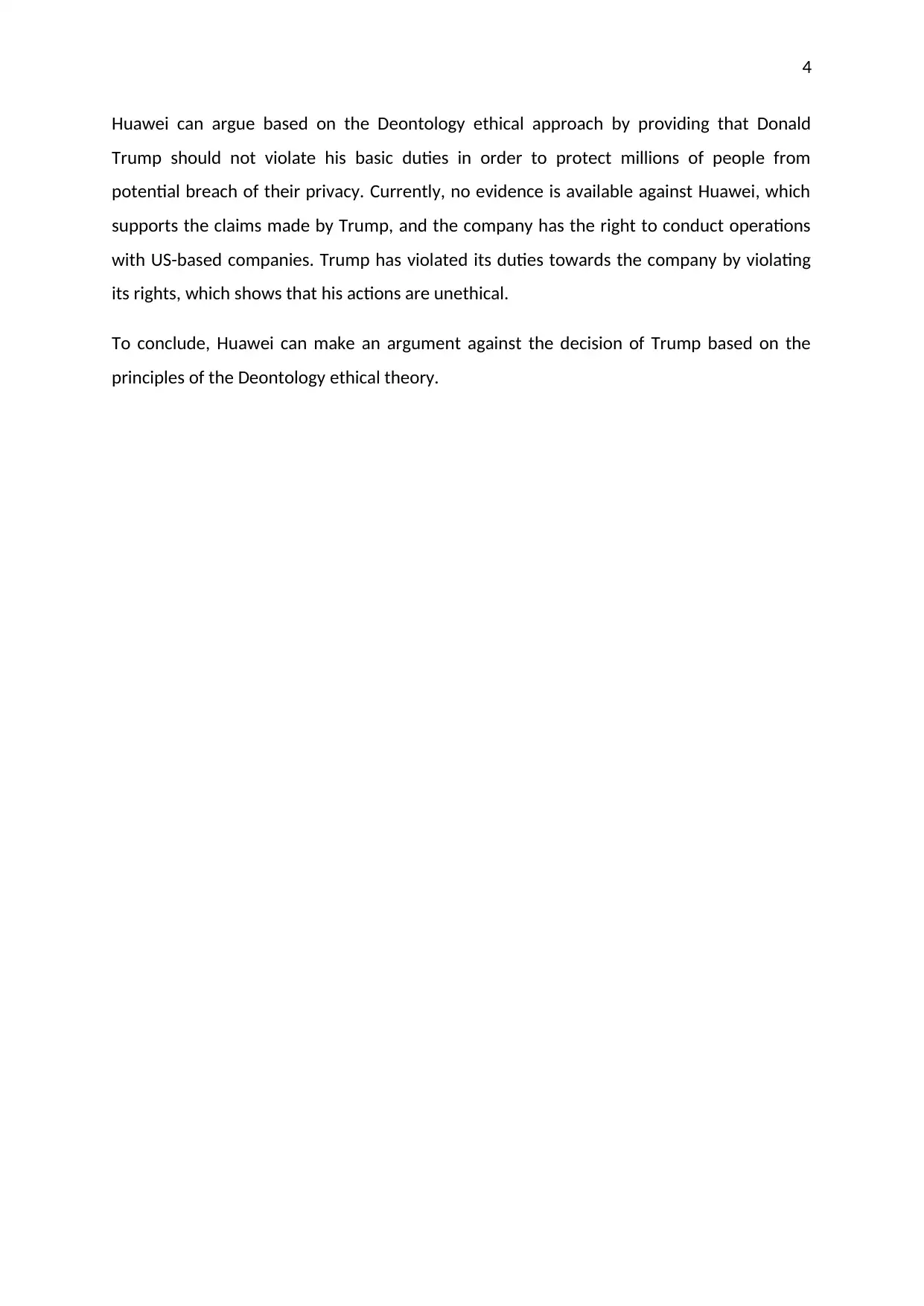
4
Huawei can argue based on the Deontology ethical approach by providing that Donald
Trump should not violate his basic duties in order to protect millions of people from
potential breach of their privacy. Currently, no evidence is available against Huawei, which
supports the claims made by Trump, and the company has the right to conduct operations
with US-based companies. Trump has violated its duties towards the company by violating
its rights, which shows that his actions are unethical.
To conclude, Huawei can make an argument against the decision of Trump based on the
principles of the Deontology ethical theory.
Huawei can argue based on the Deontology ethical approach by providing that Donald
Trump should not violate his basic duties in order to protect millions of people from
potential breach of their privacy. Currently, no evidence is available against Huawei, which
supports the claims made by Trump, and the company has the right to conduct operations
with US-based companies. Trump has violated its duties towards the company by violating
its rights, which shows that his actions are unethical.
To conclude, Huawei can make an argument against the decision of Trump based on the
principles of the Deontology ethical theory.
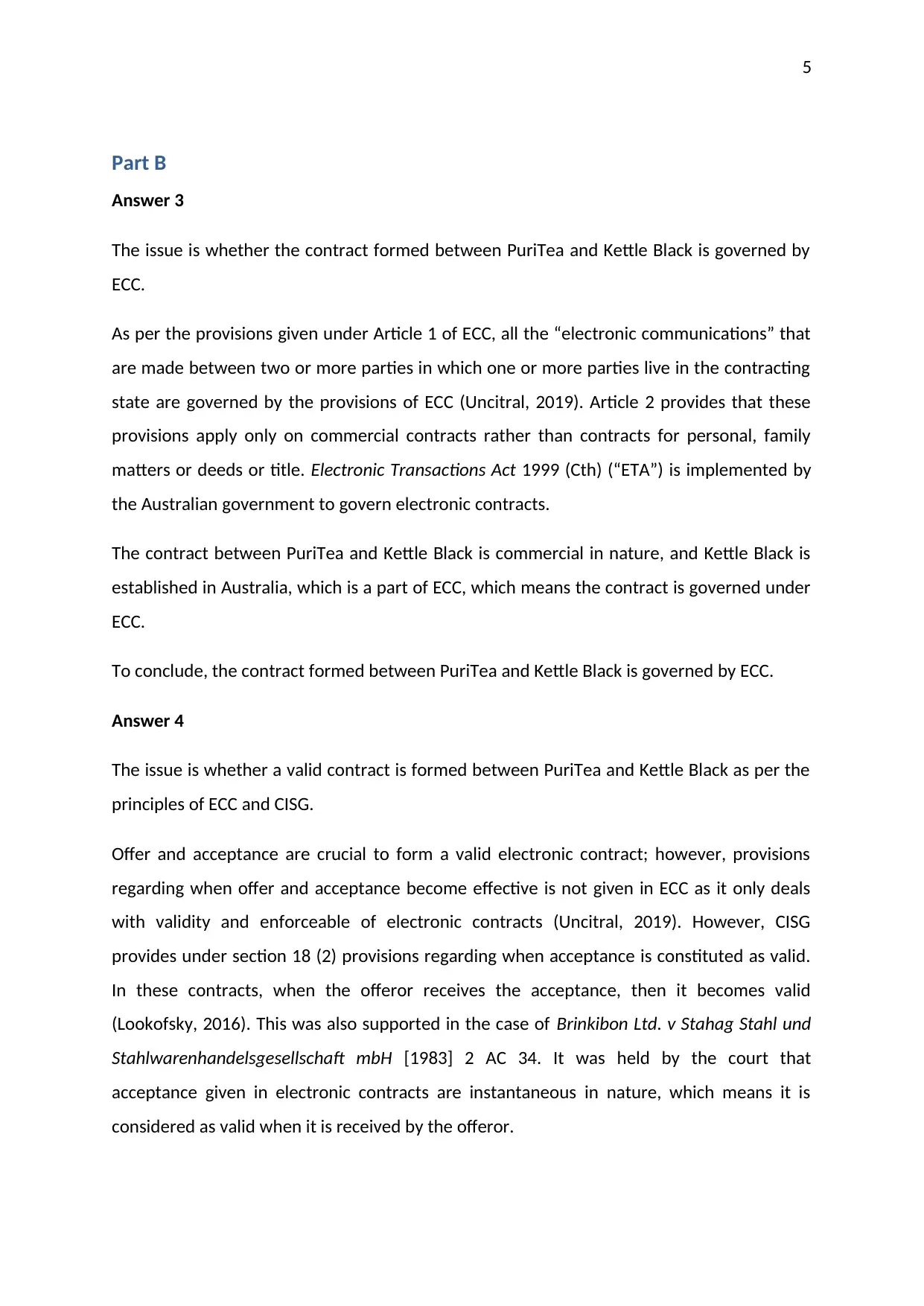
5
Part B
Answer 3
The issue is whether the contract formed between PuriTea and Kettle Black is governed by
ECC.
As per the provisions given under Article 1 of ECC, all the “electronic communications” that
are made between two or more parties in which one or more parties live in the contracting
state are governed by the provisions of ECC (Uncitral, 2019). Article 2 provides that these
provisions apply only on commercial contracts rather than contracts for personal, family
matters or deeds or title. Electronic Transactions Act 1999 (Cth) (“ETA”) is implemented by
the Australian government to govern electronic contracts.
The contract between PuriTea and Kettle Black is commercial in nature, and Kettle Black is
established in Australia, which is a part of ECC, which means the contract is governed under
ECC.
To conclude, the contract formed between PuriTea and Kettle Black is governed by ECC.
Answer 4
The issue is whether a valid contract is formed between PuriTea and Kettle Black as per the
principles of ECC and CISG.
Offer and acceptance are crucial to form a valid electronic contract; however, provisions
regarding when offer and acceptance become effective is not given in ECC as it only deals
with validity and enforceable of electronic contracts (Uncitral, 2019). However, CISG
provides under section 18 (2) provisions regarding when acceptance is constituted as valid.
In these contracts, when the offeror receives the acceptance, then it becomes valid
(Lookofsky, 2016). This was also supported in the case of Brinkibon Ltd. v Stahag Stahl und
Stahlwarenhandelsgesellschaft mbH [1983] 2 AC 34. It was held by the court that
acceptance given in electronic contracts are instantaneous in nature, which means it is
considered as valid when it is received by the offeror.
Part B
Answer 3
The issue is whether the contract formed between PuriTea and Kettle Black is governed by
ECC.
As per the provisions given under Article 1 of ECC, all the “electronic communications” that
are made between two or more parties in which one or more parties live in the contracting
state are governed by the provisions of ECC (Uncitral, 2019). Article 2 provides that these
provisions apply only on commercial contracts rather than contracts for personal, family
matters or deeds or title. Electronic Transactions Act 1999 (Cth) (“ETA”) is implemented by
the Australian government to govern electronic contracts.
The contract between PuriTea and Kettle Black is commercial in nature, and Kettle Black is
established in Australia, which is a part of ECC, which means the contract is governed under
ECC.
To conclude, the contract formed between PuriTea and Kettle Black is governed by ECC.
Answer 4
The issue is whether a valid contract is formed between PuriTea and Kettle Black as per the
principles of ECC and CISG.
Offer and acceptance are crucial to form a valid electronic contract; however, provisions
regarding when offer and acceptance become effective is not given in ECC as it only deals
with validity and enforceable of electronic contracts (Uncitral, 2019). However, CISG
provides under section 18 (2) provisions regarding when acceptance is constituted as valid.
In these contracts, when the offeror receives the acceptance, then it becomes valid
(Lookofsky, 2016). This was also supported in the case of Brinkibon Ltd. v Stahag Stahl und
Stahlwarenhandelsgesellschaft mbH [1983] 2 AC 34. It was held by the court that
acceptance given in electronic contracts are instantaneous in nature, which means it is
considered as valid when it is received by the offeror.
⊘ This is a preview!⊘
Do you want full access?
Subscribe today to unlock all pages.

Trusted by 1+ million students worldwide
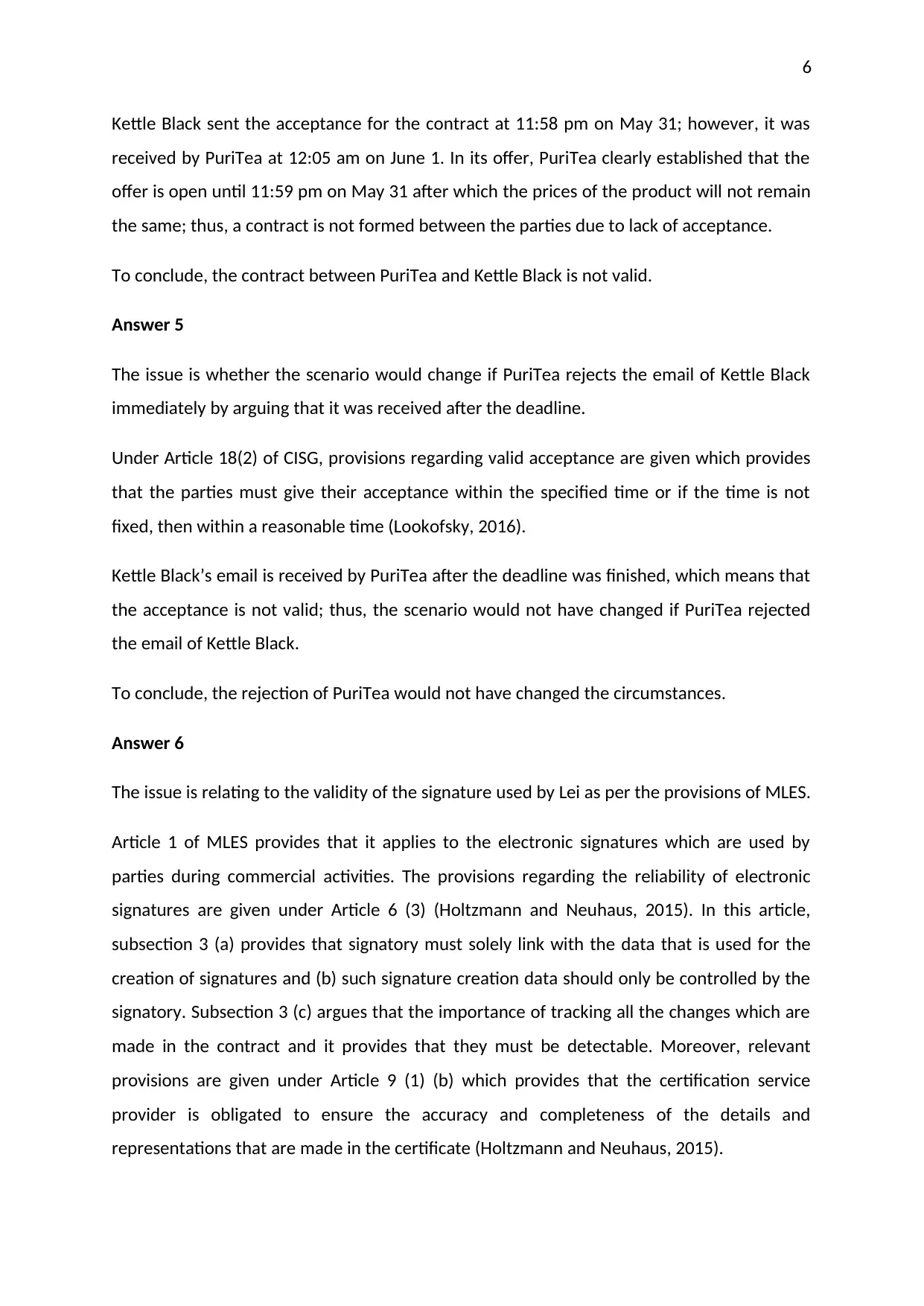
6
Kettle Black sent the acceptance for the contract at 11:58 pm on May 31; however, it was
received by PuriTea at 12:05 am on June 1. In its offer, PuriTea clearly established that the
offer is open until 11:59 pm on May 31 after which the prices of the product will not remain
the same; thus, a contract is not formed between the parties due to lack of acceptance.
To conclude, the contract between PuriTea and Kettle Black is not valid.
Answer 5
The issue is whether the scenario would change if PuriTea rejects the email of Kettle Black
immediately by arguing that it was received after the deadline.
Under Article 18(2) of CISG, provisions regarding valid acceptance are given which provides
that the parties must give their acceptance within the specified time or if the time is not
fixed, then within a reasonable time (Lookofsky, 2016).
Kettle Black’s email is received by PuriTea after the deadline was finished, which means that
the acceptance is not valid; thus, the scenario would not have changed if PuriTea rejected
the email of Kettle Black.
To conclude, the rejection of PuriTea would not have changed the circumstances.
Answer 6
The issue is relating to the validity of the signature used by Lei as per the provisions of MLES.
Article 1 of MLES provides that it applies to the electronic signatures which are used by
parties during commercial activities. The provisions regarding the reliability of electronic
signatures are given under Article 6 (3) (Holtzmann and Neuhaus, 2015). In this article,
subsection 3 (a) provides that signatory must solely link with the data that is used for the
creation of signatures and (b) such signature creation data should only be controlled by the
signatory. Subsection 3 (c) argues that the importance of tracking all the changes which are
made in the contract and it provides that they must be detectable. Moreover, relevant
provisions are given under Article 9 (1) (b) which provides that the certification service
provider is obligated to ensure the accuracy and completeness of the details and
representations that are made in the certificate (Holtzmann and Neuhaus, 2015).
Kettle Black sent the acceptance for the contract at 11:58 pm on May 31; however, it was
received by PuriTea at 12:05 am on June 1. In its offer, PuriTea clearly established that the
offer is open until 11:59 pm on May 31 after which the prices of the product will not remain
the same; thus, a contract is not formed between the parties due to lack of acceptance.
To conclude, the contract between PuriTea and Kettle Black is not valid.
Answer 5
The issue is whether the scenario would change if PuriTea rejects the email of Kettle Black
immediately by arguing that it was received after the deadline.
Under Article 18(2) of CISG, provisions regarding valid acceptance are given which provides
that the parties must give their acceptance within the specified time or if the time is not
fixed, then within a reasonable time (Lookofsky, 2016).
Kettle Black’s email is received by PuriTea after the deadline was finished, which means that
the acceptance is not valid; thus, the scenario would not have changed if PuriTea rejected
the email of Kettle Black.
To conclude, the rejection of PuriTea would not have changed the circumstances.
Answer 6
The issue is relating to the validity of the signature used by Lei as per the provisions of MLES.
Article 1 of MLES provides that it applies to the electronic signatures which are used by
parties during commercial activities. The provisions regarding the reliability of electronic
signatures are given under Article 6 (3) (Holtzmann and Neuhaus, 2015). In this article,
subsection 3 (a) provides that signatory must solely link with the data that is used for the
creation of signatures and (b) such signature creation data should only be controlled by the
signatory. Subsection 3 (c) argues that the importance of tracking all the changes which are
made in the contract and it provides that they must be detectable. Moreover, relevant
provisions are given under Article 9 (1) (b) which provides that the certification service
provider is obligated to ensure the accuracy and completeness of the details and
representations that are made in the certificate (Holtzmann and Neuhaus, 2015).
Paraphrase This Document
Need a fresh take? Get an instant paraphrase of this document with our AI Paraphraser
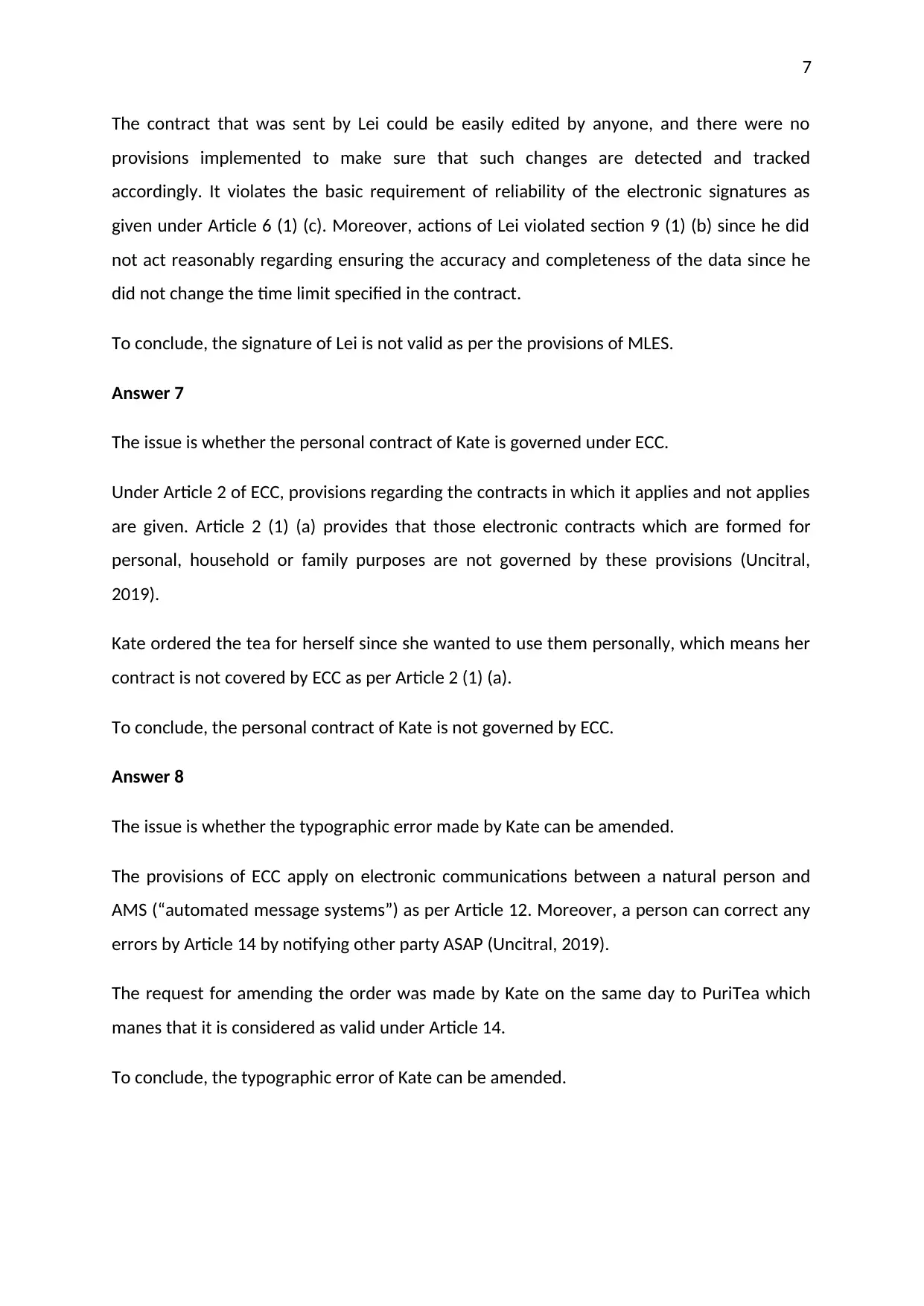
7
The contract that was sent by Lei could be easily edited by anyone, and there were no
provisions implemented to make sure that such changes are detected and tracked
accordingly. It violates the basic requirement of reliability of the electronic signatures as
given under Article 6 (1) (c). Moreover, actions of Lei violated section 9 (1) (b) since he did
not act reasonably regarding ensuring the accuracy and completeness of the data since he
did not change the time limit specified in the contract.
To conclude, the signature of Lei is not valid as per the provisions of MLES.
Answer 7
The issue is whether the personal contract of Kate is governed under ECC.
Under Article 2 of ECC, provisions regarding the contracts in which it applies and not applies
are given. Article 2 (1) (a) provides that those electronic contracts which are formed for
personal, household or family purposes are not governed by these provisions (Uncitral,
2019).
Kate ordered the tea for herself since she wanted to use them personally, which means her
contract is not covered by ECC as per Article 2 (1) (a).
To conclude, the personal contract of Kate is not governed by ECC.
Answer 8
The issue is whether the typographic error made by Kate can be amended.
The provisions of ECC apply on electronic communications between a natural person and
AMS (“automated message systems”) as per Article 12. Moreover, a person can correct any
errors by Article 14 by notifying other party ASAP (Uncitral, 2019).
The request for amending the order was made by Kate on the same day to PuriTea which
manes that it is considered as valid under Article 14.
To conclude, the typographic error of Kate can be amended.
The contract that was sent by Lei could be easily edited by anyone, and there were no
provisions implemented to make sure that such changes are detected and tracked
accordingly. It violates the basic requirement of reliability of the electronic signatures as
given under Article 6 (1) (c). Moreover, actions of Lei violated section 9 (1) (b) since he did
not act reasonably regarding ensuring the accuracy and completeness of the data since he
did not change the time limit specified in the contract.
To conclude, the signature of Lei is not valid as per the provisions of MLES.
Answer 7
The issue is whether the personal contract of Kate is governed under ECC.
Under Article 2 of ECC, provisions regarding the contracts in which it applies and not applies
are given. Article 2 (1) (a) provides that those electronic contracts which are formed for
personal, household or family purposes are not governed by these provisions (Uncitral,
2019).
Kate ordered the tea for herself since she wanted to use them personally, which means her
contract is not covered by ECC as per Article 2 (1) (a).
To conclude, the personal contract of Kate is not governed by ECC.
Answer 8
The issue is whether the typographic error made by Kate can be amended.
The provisions of ECC apply on electronic communications between a natural person and
AMS (“automated message systems”) as per Article 12. Moreover, a person can correct any
errors by Article 14 by notifying other party ASAP (Uncitral, 2019).
The request for amending the order was made by Kate on the same day to PuriTea which
manes that it is considered as valid under Article 14.
To conclude, the typographic error of Kate can be amended.
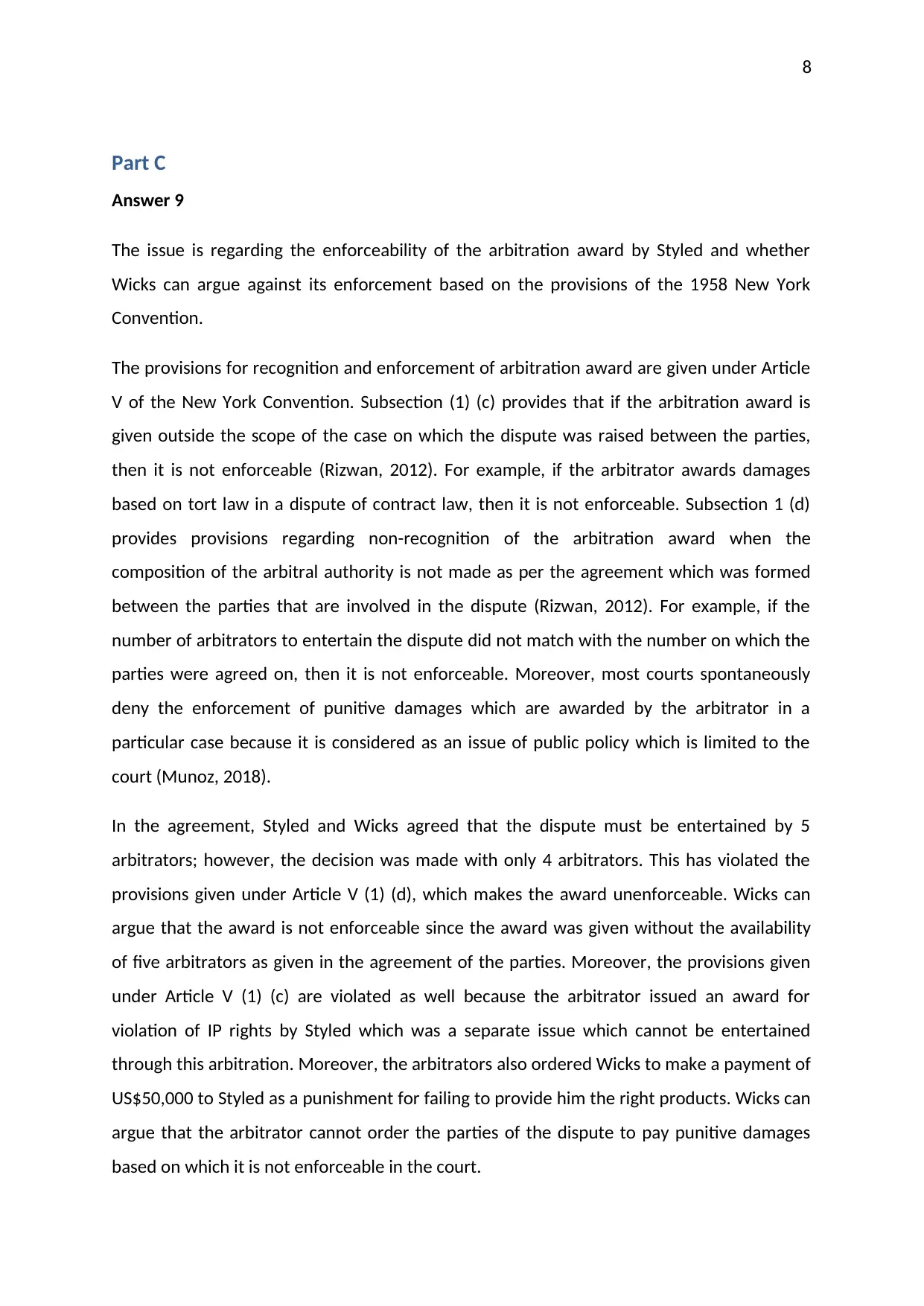
8
Part C
Answer 9
The issue is regarding the enforceability of the arbitration award by Styled and whether
Wicks can argue against its enforcement based on the provisions of the 1958 New York
Convention.
The provisions for recognition and enforcement of arbitration award are given under Article
V of the New York Convention. Subsection (1) (c) provides that if the arbitration award is
given outside the scope of the case on which the dispute was raised between the parties,
then it is not enforceable (Rizwan, 2012). For example, if the arbitrator awards damages
based on tort law in a dispute of contract law, then it is not enforceable. Subsection 1 (d)
provides provisions regarding non-recognition of the arbitration award when the
composition of the arbitral authority is not made as per the agreement which was formed
between the parties that are involved in the dispute (Rizwan, 2012). For example, if the
number of arbitrators to entertain the dispute did not match with the number on which the
parties were agreed on, then it is not enforceable. Moreover, most courts spontaneously
deny the enforcement of punitive damages which are awarded by the arbitrator in a
particular case because it is considered as an issue of public policy which is limited to the
court (Munoz, 2018).
In the agreement, Styled and Wicks agreed that the dispute must be entertained by 5
arbitrators; however, the decision was made with only 4 arbitrators. This has violated the
provisions given under Article V (1) (d), which makes the award unenforceable. Wicks can
argue that the award is not enforceable since the award was given without the availability
of five arbitrators as given in the agreement of the parties. Moreover, the provisions given
under Article V (1) (c) are violated as well because the arbitrator issued an award for
violation of IP rights by Styled which was a separate issue which cannot be entertained
through this arbitration. Moreover, the arbitrators also ordered Wicks to make a payment of
US$50,000 to Styled as a punishment for failing to provide him the right products. Wicks can
argue that the arbitrator cannot order the parties of the dispute to pay punitive damages
based on which it is not enforceable in the court.
Part C
Answer 9
The issue is regarding the enforceability of the arbitration award by Styled and whether
Wicks can argue against its enforcement based on the provisions of the 1958 New York
Convention.
The provisions for recognition and enforcement of arbitration award are given under Article
V of the New York Convention. Subsection (1) (c) provides that if the arbitration award is
given outside the scope of the case on which the dispute was raised between the parties,
then it is not enforceable (Rizwan, 2012). For example, if the arbitrator awards damages
based on tort law in a dispute of contract law, then it is not enforceable. Subsection 1 (d)
provides provisions regarding non-recognition of the arbitration award when the
composition of the arbitral authority is not made as per the agreement which was formed
between the parties that are involved in the dispute (Rizwan, 2012). For example, if the
number of arbitrators to entertain the dispute did not match with the number on which the
parties were agreed on, then it is not enforceable. Moreover, most courts spontaneously
deny the enforcement of punitive damages which are awarded by the arbitrator in a
particular case because it is considered as an issue of public policy which is limited to the
court (Munoz, 2018).
In the agreement, Styled and Wicks agreed that the dispute must be entertained by 5
arbitrators; however, the decision was made with only 4 arbitrators. This has violated the
provisions given under Article V (1) (d), which makes the award unenforceable. Wicks can
argue that the award is not enforceable since the award was given without the availability
of five arbitrators as given in the agreement of the parties. Moreover, the provisions given
under Article V (1) (c) are violated as well because the arbitrator issued an award for
violation of IP rights by Styled which was a separate issue which cannot be entertained
through this arbitration. Moreover, the arbitrators also ordered Wicks to make a payment of
US$50,000 to Styled as a punishment for failing to provide him the right products. Wicks can
argue that the arbitrator cannot order the parties of the dispute to pay punitive damages
based on which it is not enforceable in the court.
⊘ This is a preview!⊘
Do you want full access?
Subscribe today to unlock all pages.

Trusted by 1+ million students worldwide
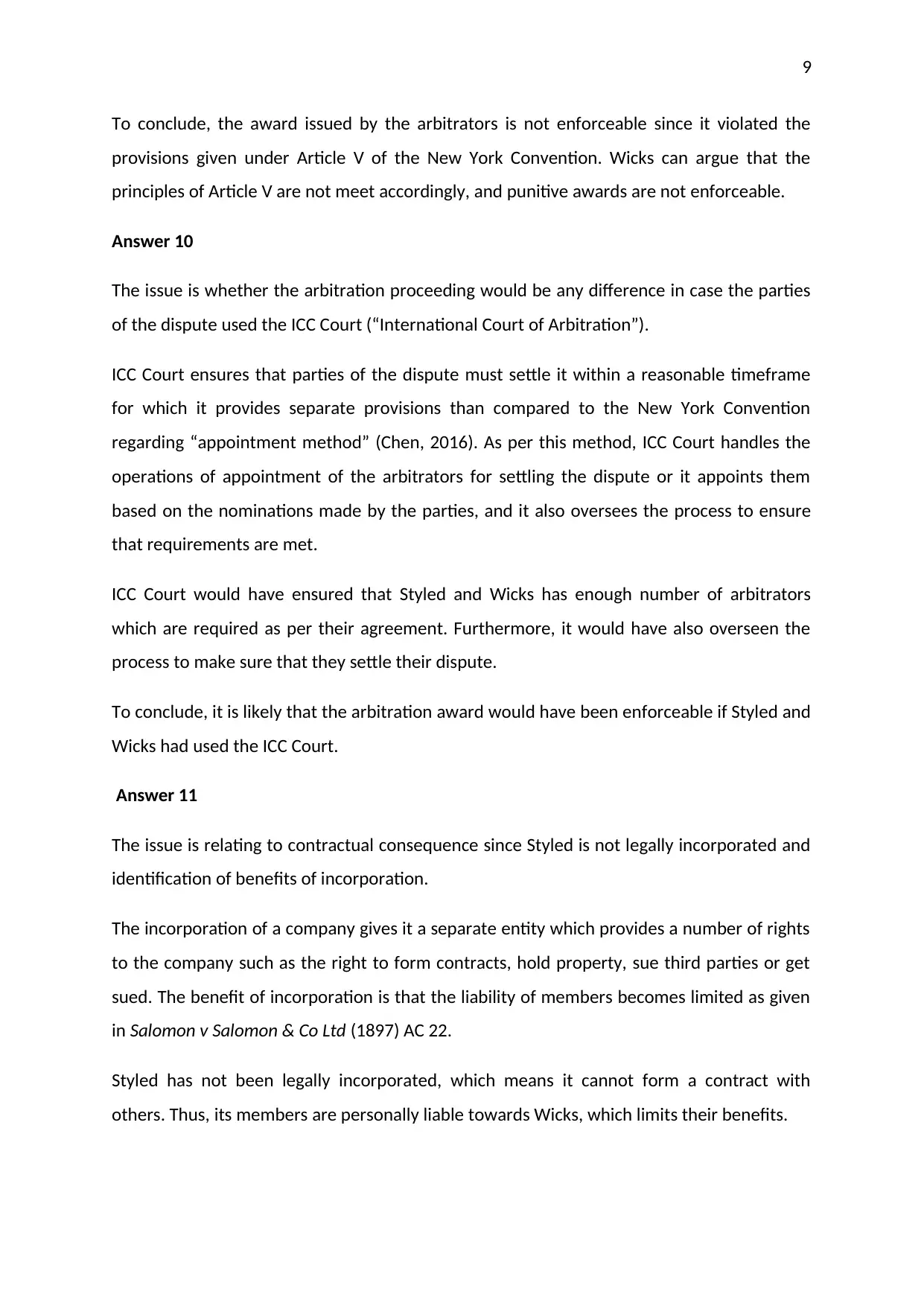
9
To conclude, the award issued by the arbitrators is not enforceable since it violated the
provisions given under Article V of the New York Convention. Wicks can argue that the
principles of Article V are not meet accordingly, and punitive awards are not enforceable.
Answer 10
The issue is whether the arbitration proceeding would be any difference in case the parties
of the dispute used the ICC Court (“International Court of Arbitration”).
ICC Court ensures that parties of the dispute must settle it within a reasonable timeframe
for which it provides separate provisions than compared to the New York Convention
regarding “appointment method” (Chen, 2016). As per this method, ICC Court handles the
operations of appointment of the arbitrators for settling the dispute or it appoints them
based on the nominations made by the parties, and it also oversees the process to ensure
that requirements are met.
ICC Court would have ensured that Styled and Wicks has enough number of arbitrators
which are required as per their agreement. Furthermore, it would have also overseen the
process to make sure that they settle their dispute.
To conclude, it is likely that the arbitration award would have been enforceable if Styled and
Wicks had used the ICC Court.
Answer 11
The issue is relating to contractual consequence since Styled is not legally incorporated and
identification of benefits of incorporation.
The incorporation of a company gives it a separate entity which provides a number of rights
to the company such as the right to form contracts, hold property, sue third parties or get
sued. The benefit of incorporation is that the liability of members becomes limited as given
in Salomon v Salomon & Co Ltd (1897) AC 22.
Styled has not been legally incorporated, which means it cannot form a contract with
others. Thus, its members are personally liable towards Wicks, which limits their benefits.
To conclude, the award issued by the arbitrators is not enforceable since it violated the
provisions given under Article V of the New York Convention. Wicks can argue that the
principles of Article V are not meet accordingly, and punitive awards are not enforceable.
Answer 10
The issue is whether the arbitration proceeding would be any difference in case the parties
of the dispute used the ICC Court (“International Court of Arbitration”).
ICC Court ensures that parties of the dispute must settle it within a reasonable timeframe
for which it provides separate provisions than compared to the New York Convention
regarding “appointment method” (Chen, 2016). As per this method, ICC Court handles the
operations of appointment of the arbitrators for settling the dispute or it appoints them
based on the nominations made by the parties, and it also oversees the process to ensure
that requirements are met.
ICC Court would have ensured that Styled and Wicks has enough number of arbitrators
which are required as per their agreement. Furthermore, it would have also overseen the
process to make sure that they settle their dispute.
To conclude, it is likely that the arbitration award would have been enforceable if Styled and
Wicks had used the ICC Court.
Answer 11
The issue is relating to contractual consequence since Styled is not legally incorporated and
identification of benefits of incorporation.
The incorporation of a company gives it a separate entity which provides a number of rights
to the company such as the right to form contracts, hold property, sue third parties or get
sued. The benefit of incorporation is that the liability of members becomes limited as given
in Salomon v Salomon & Co Ltd (1897) AC 22.
Styled has not been legally incorporated, which means it cannot form a contract with
others. Thus, its members are personally liable towards Wicks, which limits their benefits.
Paraphrase This Document
Need a fresh take? Get an instant paraphrase of this document with our AI Paraphraser
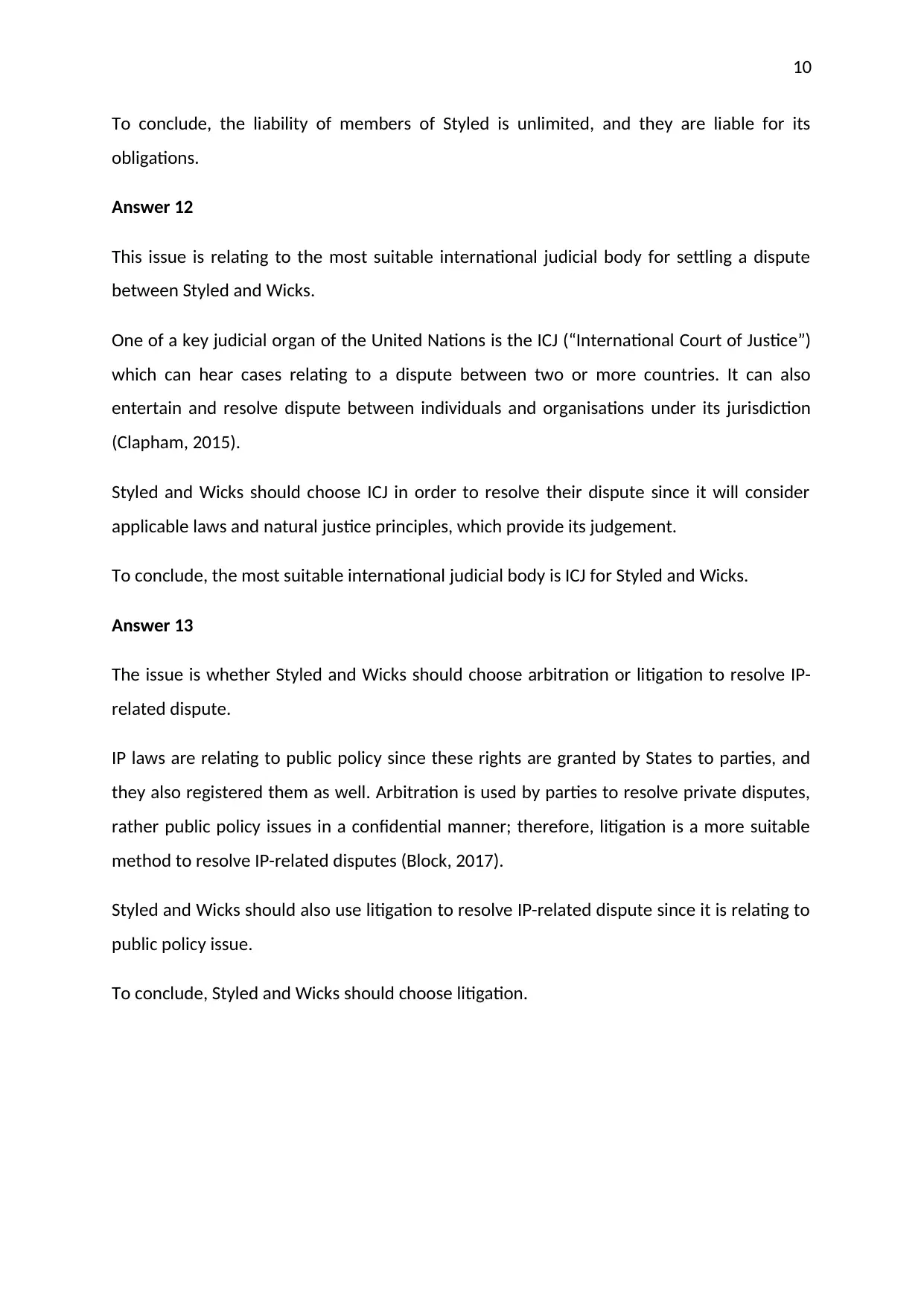
10
To conclude, the liability of members of Styled is unlimited, and they are liable for its
obligations.
Answer 12
This issue is relating to the most suitable international judicial body for settling a dispute
between Styled and Wicks.
One of a key judicial organ of the United Nations is the ICJ (“International Court of Justice”)
which can hear cases relating to a dispute between two or more countries. It can also
entertain and resolve dispute between individuals and organisations under its jurisdiction
(Clapham, 2015).
Styled and Wicks should choose ICJ in order to resolve their dispute since it will consider
applicable laws and natural justice principles, which provide its judgement.
To conclude, the most suitable international judicial body is ICJ for Styled and Wicks.
Answer 13
The issue is whether Styled and Wicks should choose arbitration or litigation to resolve IP-
related dispute.
IP laws are relating to public policy since these rights are granted by States to parties, and
they also registered them as well. Arbitration is used by parties to resolve private disputes,
rather public policy issues in a confidential manner; therefore, litigation is a more suitable
method to resolve IP-related disputes (Block, 2017).
Styled and Wicks should also use litigation to resolve IP-related dispute since it is relating to
public policy issue.
To conclude, Styled and Wicks should choose litigation.
To conclude, the liability of members of Styled is unlimited, and they are liable for its
obligations.
Answer 12
This issue is relating to the most suitable international judicial body for settling a dispute
between Styled and Wicks.
One of a key judicial organ of the United Nations is the ICJ (“International Court of Justice”)
which can hear cases relating to a dispute between two or more countries. It can also
entertain and resolve dispute between individuals and organisations under its jurisdiction
(Clapham, 2015).
Styled and Wicks should choose ICJ in order to resolve their dispute since it will consider
applicable laws and natural justice principles, which provide its judgement.
To conclude, the most suitable international judicial body is ICJ for Styled and Wicks.
Answer 13
The issue is whether Styled and Wicks should choose arbitration or litigation to resolve IP-
related dispute.
IP laws are relating to public policy since these rights are granted by States to parties, and
they also registered them as well. Arbitration is used by parties to resolve private disputes,
rather public policy issues in a confidential manner; therefore, litigation is a more suitable
method to resolve IP-related disputes (Block, 2017).
Styled and Wicks should also use litigation to resolve IP-related dispute since it is relating to
public policy issue.
To conclude, Styled and Wicks should choose litigation.
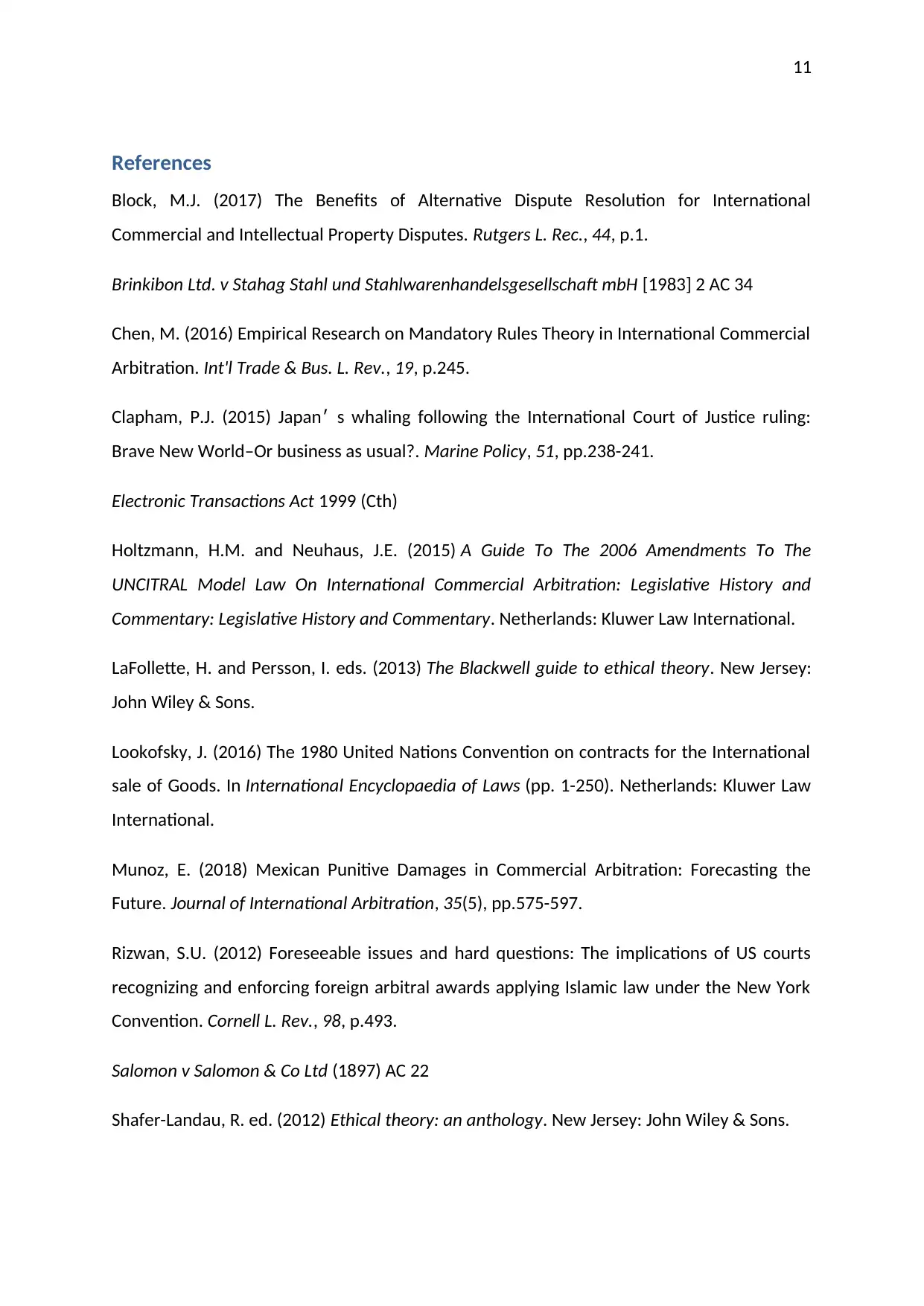
11
References
Block, M.J. (2017) The Benefits of Alternative Dispute Resolution for International
Commercial and Intellectual Property Disputes. Rutgers L. Rec., 44, p.1.
Brinkibon Ltd. v Stahag Stahl und Stahlwarenhandelsgesellschaft mbH [1983] 2 AC 34
Chen, M. (2016) Empirical Research on Mandatory Rules Theory in International Commercial
Arbitration. Int'l Trade & Bus. L. Rev., 19, p.245.
Clapham, P.J. (2015) Japan׳ s whaling following the International Court of Justice ruling:
Brave New World–Or business as usual?. Marine Policy, 51, pp.238-241.
Electronic Transactions Act 1999 (Cth)
Holtzmann, H.M. and Neuhaus, J.E. (2015) A Guide To The 2006 Amendments To The
UNCITRAL Model Law On International Commercial Arbitration: Legislative History and
Commentary: Legislative History and Commentary. Netherlands: Kluwer Law International.
LaFollette, H. and Persson, I. eds. (2013) The Blackwell guide to ethical theory. New Jersey:
John Wiley & Sons.
Lookofsky, J. (2016) The 1980 United Nations Convention on contracts for the International
sale of Goods. In International Encyclopaedia of Laws (pp. 1-250). Netherlands: Kluwer Law
International.
Munoz, E. (2018) Mexican Punitive Damages in Commercial Arbitration: Forecasting the
Future. Journal of International Arbitration, 35(5), pp.575-597.
Rizwan, S.U. (2012) Foreseeable issues and hard questions: The implications of US courts
recognizing and enforcing foreign arbitral awards applying Islamic law under the New York
Convention. Cornell L. Rev., 98, p.493.
Salomon v Salomon & Co Ltd (1897) AC 22
Shafer-Landau, R. ed. (2012) Ethical theory: an anthology. New Jersey: John Wiley & Sons.
References
Block, M.J. (2017) The Benefits of Alternative Dispute Resolution for International
Commercial and Intellectual Property Disputes. Rutgers L. Rec., 44, p.1.
Brinkibon Ltd. v Stahag Stahl und Stahlwarenhandelsgesellschaft mbH [1983] 2 AC 34
Chen, M. (2016) Empirical Research on Mandatory Rules Theory in International Commercial
Arbitration. Int'l Trade & Bus. L. Rev., 19, p.245.
Clapham, P.J. (2015) Japan׳ s whaling following the International Court of Justice ruling:
Brave New World–Or business as usual?. Marine Policy, 51, pp.238-241.
Electronic Transactions Act 1999 (Cth)
Holtzmann, H.M. and Neuhaus, J.E. (2015) A Guide To The 2006 Amendments To The
UNCITRAL Model Law On International Commercial Arbitration: Legislative History and
Commentary: Legislative History and Commentary. Netherlands: Kluwer Law International.
LaFollette, H. and Persson, I. eds. (2013) The Blackwell guide to ethical theory. New Jersey:
John Wiley & Sons.
Lookofsky, J. (2016) The 1980 United Nations Convention on contracts for the International
sale of Goods. In International Encyclopaedia of Laws (pp. 1-250). Netherlands: Kluwer Law
International.
Munoz, E. (2018) Mexican Punitive Damages in Commercial Arbitration: Forecasting the
Future. Journal of International Arbitration, 35(5), pp.575-597.
Rizwan, S.U. (2012) Foreseeable issues and hard questions: The implications of US courts
recognizing and enforcing foreign arbitral awards applying Islamic law under the New York
Convention. Cornell L. Rev., 98, p.493.
Salomon v Salomon & Co Ltd (1897) AC 22
Shafer-Landau, R. ed. (2012) Ethical theory: an anthology. New Jersey: John Wiley & Sons.
⊘ This is a preview!⊘
Do you want full access?
Subscribe today to unlock all pages.

Trusted by 1+ million students worldwide
1 out of 13
Your All-in-One AI-Powered Toolkit for Academic Success.
+13062052269
info@desklib.com
Available 24*7 on WhatsApp / Email
![[object Object]](/_next/static/media/star-bottom.7253800d.svg)
Unlock your academic potential
Copyright © 2020–2026 A2Z Services. All Rights Reserved. Developed and managed by ZUCOL.


